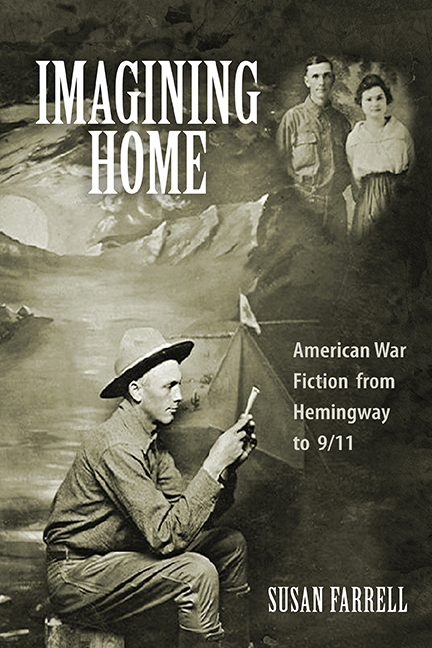Book contents
- Frontmatter
- Contents
- Acknowledgments
- Introduction
- 1 “Isn't It Pretty to Think So?”: Ernest Hemingway's Impossible Homes
- 2 A “Nation of Two”: Constructing Worlds through Narrative in the Work of Kurt Vonnegut
- 3 “It Wasn't a War Story. It Was a Love Story”: Tim O'Brien and the Ethics of Home
- 4 “A Hole in the Middle of Me”: Shattered Homes in Post-9/11 Literature
- Afterword
- Notes
- Works Cited
- Index
4 - “A Hole in the Middle of Me”: Shattered Homes in Post-9/11 Literature
Published online by Cambridge University Press: 25 August 2018
- Frontmatter
- Contents
- Acknowledgments
- Introduction
- 1 “Isn't It Pretty to Think So?”: Ernest Hemingway's Impossible Homes
- 2 A “Nation of Two”: Constructing Worlds through Narrative in the Work of Kurt Vonnegut
- 3 “It Wasn't a War Story. It Was a Love Story”: Tim O'Brien and the Ethics of Home
- 4 “A Hole in the Middle of Me”: Shattered Homes in Post-9/11 Literature
- Afterword
- Notes
- Works Cited
- Index
Summary
Part I. Introduction
WHILE THE PREVIOUS CHAPTERS in this study explored literary characterizations of the experiences of American soldiers who fought in overseas wars in Italy, Spain, Germany, and Southeast Asia, as well as the aftereffects of these wars on both the soldiers themselves and on those who remained at home, this chapter focuses on representations of what happens when the front lines actually come home—when the American domestic space itself becomes the target of violent foreign assault, as was the case in the September 11, 2001, terrorist attacks on New York and Washington, DC. Not surprisingly, as happened with other major US wars, a robust body of American literature has grown up in response to the attacks specifically and to the global War on Terror more generally. And literary critics have not lagged far behind, with at least eight fulllength, single-authored studies and at least three collections of essays focusing on 9/11 literature and film published in the fifteen years following the attacks. The destruction of the Twin Towers, as several of these critics point out, was the first time since the 1812 war with Great Britain that the American mainland had been invaded, its borders significantly penetrated. (The bombing of Pearl Harbor is often discussed as an attack on a military institution on America's periphery and thus significantly different from the direct assault on the US civilian population in New York City and Washington, DC, in September 2011). No wonder, then, that much of the criticism that examines artistic responses to 9/11 focuses on the way that this literature is formally or thematically new or innovative, different from past American literature, as it reacts to a wholly new crisis, especially to what is frequently described as the “unspeakable” trauma of 9/11.
It is this sense that language itself is inadequate to describe the scale and suffering of the events of 9/11 that many critics point to as chief among the defining characteristics that make this literature feel and seem so different from previous American literature. Kristiaan Versluys, for instance, begins his book, Out of the Blue: September 11 and the Novel, by offering a long list of critics who argue that 9/11 is “unrepresentable,” that the terrorist attacks exist “outside the bounds of language,” and that they cannot be made sense of using conventional linguistic means (2).
- Type
- Chapter
- Information
- Imagining HomeAmerican War Fiction from Hemingway to 9/11, pp. 144 - 185Publisher: Boydell & BrewerPrint publication year: 2017



